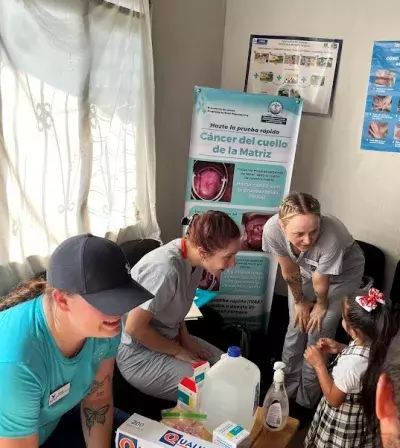In a first-of-its-kind field school opportunity, nine Kwantlen Polytechnic University (KPU) nursing students experienced a 17-day volunteer nursing expedition in Guatemala.
Alongside Bachelor of Science in Nursing instructors Cindy Milner and Connie Klimek, the team provided basic checkups, distributed medication and offered health-care education each day to communities near the city of Antigua. Their clinic was organized into seven stations: handwashing, assessment, pharmacy, deworming, dental care, breast self-exam and foot care.
“We wanted to give our students a unique opportunity to gain new perspectives on healthcare and learn outside of the traditional classroom setting,” says Milner, who was the program lead. “It was incredible to see each student step out of their comfort zone and grow both professionally and personally in such a short amount of time.”

Student Erin Blackmore had the idea to include a breast self-examination station and was pivotal in implementing the initiative.
“Breast cancer is one of the leading causes of death in women in Guatemala,” says Blackmore. “It was very fulfilling to educate women and give them a first line of defence towards breast cancer by performing their own self-exams.”
When it came to working in the clinic, no day looked the same. From rural to urban regions of Guatemala, the team would set up their pop-up clinic in a different area each day — including a day spent alongside a smoky volcano.
Although the students initially expected to gain an understanding on global health as a whole, this constant change in setting was a valuable lesson on how stark the difference in health can be within a population. For instance, residents in the volcanic areas may present more respiratory issues due to increased smoke exposure.
“Learning the difference between global health and population health was a key lesson for us,” says Klimek. “We could really benefit from a population-health approach here in Canada, especially when it comes to Indigenous communities.”

Students who participated in the field school received credits that went towards their degree, but learning went both ways for the instructors and students. Alongside students, Milner and Klimek saw beyond western health perspectives to learn from the locals on traditional health practices, diet, culture and more.
“The playing field was really levelled between teacher and student,” Klimek reflects. “We were co-learning in this environment that was new to all of us, not just the students.”
For Blackmore, this experience left her with a greater sense of adaptability, empathy, compassion and cultural sensitivity — all of which she is certain will shape the way she approaches her future career in nursing.
“I would absolutely recommend this program to anyone,” says Blackmore. “It’s a great way to get out of your comfort zone, immerse yourself in a new culture and create bonds with your peers.”
While the field school was a first for KPU’s Faculty of Health, it won’t be the last. Nursing students will get the opportunity to expand their knowledge further in the upcoming Global Health Field School in Tanzania this October.